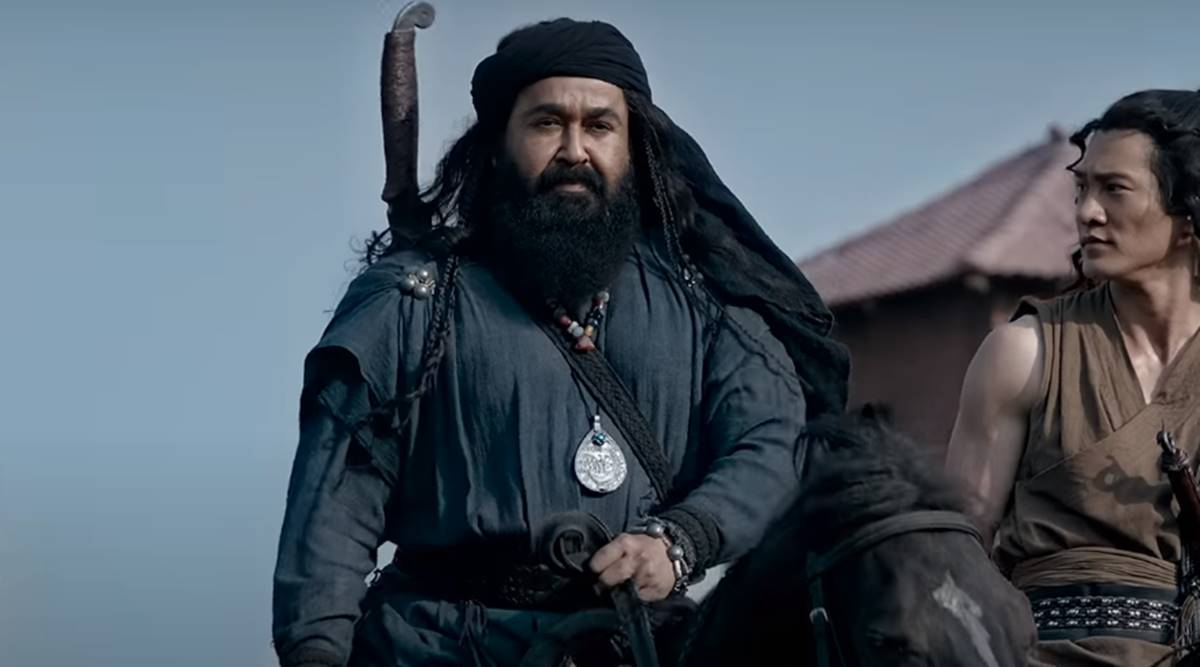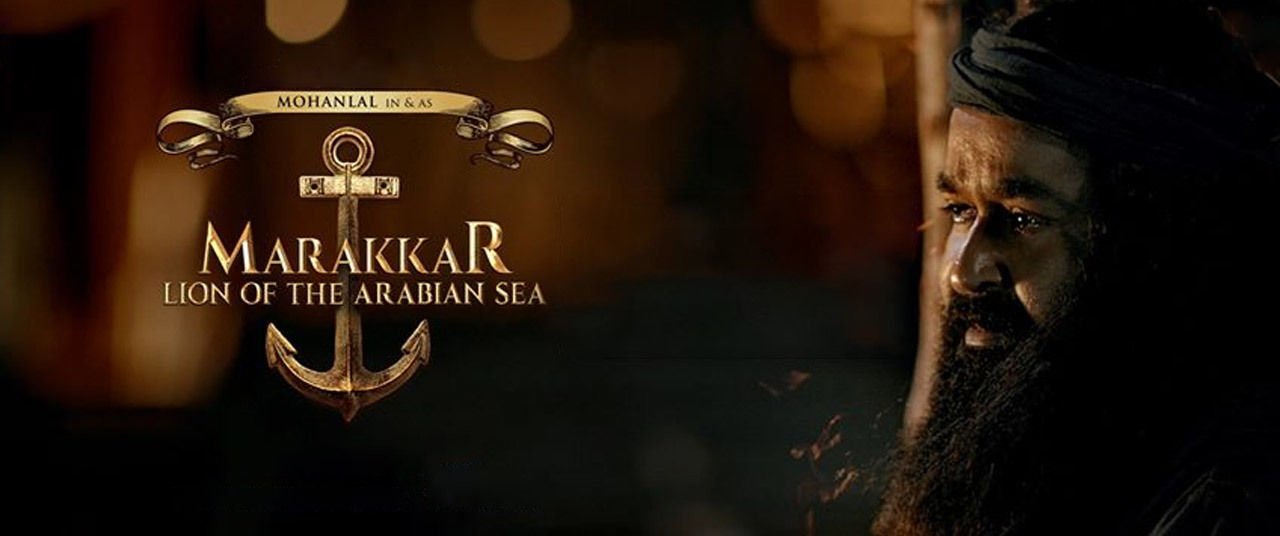When a director claims that there is only 30 per cent reliance on history in a period drama, taking an anticipatory bail on the plot of his movie, that must perhaps be a warning bell for a viewer. But with Marakkar: Lion of the Arabian Sea winning the Best Feature Film at the 67th National Film Awards, and declaring itself worthwhile only of a theatre release, our hopes were definitely turned up. Add to the bonanza a stellar cast with stars from the South and North, an ensemble cast of seasoned actors, and a director in the likes of Priyadarshan, hopes were raised sky high.
So, does Marakkar deliver? If you love a visual treat in which the scenes present themselves as dreamscapes with larger-than-life action sequences involving pitch perfect action choreography, this movie is for you. If you are a movie connoisseur, a history buff, or someone who simply loves a good story, the movie is an abysmal failure. The film maker has turned a vexing issue of political intrigue which has caught the fancy of many a historian into a movie about a family feud and personal vendetta with a hero who struggles to convince you of his acrobatic abilities, or lack thereof.
The family is massacred by the Portuguese resident who is stationed at Kochi for intervening in a local dispute during Kunjali’s wedding eve. The rest of the story is about the journey of Kunjali who goes on to become a beloved pirate and later, the naval commander of the Zamorin owing to his prowess at the sea. As a one-liner, the storyline seems very interesting. If only the screenplay and script could do justice to it, if not to history.
The constant conflation of women and land together and the harping on pure, native bloodlines is a spoke in the wheel of patriarchy which feeds vulgar cultural nationalism. On the one hand, it objectifies women and on the other, it leads to the normalisation of a protectionist mentality towards them, both of which make it impossible for women to be considered as full-fledged citizens and capable individuals
The movie fiddles with the age old, worn out trope of star-crossed lovers from warring families falling in love and the love affair leading to confusions as the woman was betrothed to someone else. Haven’t we seen the same sequence in Baahubali and more recently in Annathe ( which apparently had Keerthi Suresh playing the same role)? Who cares, as long as we make the story about a Chinese warrior and a South Indian girl, maybe the audience won’t notice! Spreading a wafer thin script over a rich tapestry of medieval-looking war costumes mostly modelled after Baahubali and Hercules will not have the audience forget factual history, starting with the basic fact that South Indian kings never wore three layers of clothing under the tropical sun. Several travelers including Vasco Da Gama, Canter Visscher and others who authored medieval accounts mention with astonishment the simplicity of the royal attire of the Zamorins, the Rajas of Travancore and of Cochin.
Also read: A Feminist Reading Of Baahubali 2: The Conclusion

What actually makes the feminist ear bleed is the constant insistence on women and land (mannum pennum in Malayalam) used in the movie as a reason for fighting against the Portuguese. In one instance, Kunjali Marakkar tries to incite people into fighting the Portuguese claiming that a defeat at the hands of the Portuguese would mean that their daughters would have to share the beds of Portuguese men and would give birth to blue eyed babies.
On another occasion, the land is equated to one’s mother and protecting it was to be understood as what makes men masculine. As seen in several other movies by the same director, there are several references to family honour, pure bloodlines and the most casteist ‘tharavaditham’ (belonging to a ‘good’ upper caste family), that make Marakkar a very problematic watch. The movie even has a screen card at the end which calls Kunjali Marakkar as India’s first freedom fighter, which cannot be more absurd as he was neither fighting for freedom or for India, but for the Kingdom of Calicut or the Zamorins at best.
In actuality, there was very little difference between the two in medieval times with even shrines of different communities resembling one another. An interesting anecdote that maybe cited in this context is Vasco Da Gama confusing a church for a temple (or vice versa) on his first visit to Kerala. Actors such as Suhasini, Manju Warrier and Keerthi Suresh are wasted in the movie and lack both screen time and presence with the exception of Keerthi Suresh meriting a song
The constant conflation of women and land together and the harping on pure, native bloodlines is a spoke in the wheel of patriarchy which feeds vulgar cultural nationalism. On the one hand, it objectifies women and on the other, it leads to the normalisation of a protectionist mentality towards them, both of which make it impossible for women to be considered as full-fledged citizens and capable individuals.

Marakkar also falls into the Orientalist trap of portraying the kings of South India as dependent and ‘effeminate’ rulers miring in riches and living a decadent life much like how they are depicted in colonial works through the colonial gaze. While some of the complexities of the court scenes are intriguing and factionalism among the Kolathiris, Naduvazhis and smaller svarupams are brought out, the scope for a more operatic, thrilling royal court drama is lost.
Even the superb acting by Harish Peradi and Nedumudi Venu could not hide the shortcomings of the barely there script and anachronistic dialogues. The North Kerala dialect which keeps slipping on and off only adds to the agony of a history loving movie watcher. The depiction of different communities –Hindu, Muslim and Christian are a far cry from how communities used to live particularly in terms of the material universe that they inhabited. Many of the sequences in the movie show a stark difference between Muslim homes and Hindu households, with the former showing a heavy Persian/Turkic influence and the latter being modelled after temple architecture.
Also read: Arundhati And The Fading Feminism In The Last Decade Of Telugu Cinema
In actuality, there was very little difference between the two in medieval times with even shrines of different communities resembling one another. An interesting anecdote that maybe cited in this context is Vasco Da Gama confusing a church for a temple (or vice versa) on his first visit to Kerala. Actors such as Suhasini, Manju Warrier and Keerthi Suresh are wasted in the movie and lack both screen time and presence with the exception of Keerthi Suresh meriting a song.
Marakkar has indeed set new limits for Mollywood in terms of VFX and animation, but it has lost out on what Malayalam cinema has been known for – good script and great story-telling. It is certainly hoped that in future re-tellings of history or myths, a little more of probing into the vivid multicultural pasts of India maybe a good starting point.





Dont u know that when lands are conquered the women are raped and lands are stolen? Haven’t u read history even a little bit? It was a patriarchal society back then and they just portrayed the view that it’s a man’s duty to protect his women. They are not conforming it, what they are doing is depicting it. Did u srsly expect them to talk like: “women should protect themselves, so u join the military and fight or u should leave the country”. This stuff didn’t even happen and would be a massive deviation from the story and would make it more illogical. For a person complaining about small aspects like difference between hindu and muslim culture do u think that this would be OK? Even nowadays it’s not safe to send women to war areas because of the threat of being captured and in that era there was no “Geneva convention” for the ENEMIES to abide by. U saw how prisoners were executed. Women would have been mass raped and women wouldn’t be of much help in the battlefield Because warfight of that age was much more Physical than this era.
U literally said that there is very little historical accuracy in the movie, but u want the director to make the scripts in such a way that it deviates from reality and abides by your viewpoints? Hypocrisy at its finest.
Very true sister.
Agree. completely.. people forget to understand history by not referring from its tims stand point but see it as of today
Please review movies like Troy and braveheart. Iam just curious to read that reviews of yours
Please review a movie based on history keeping in view the society at that time. You cannot compare women’s rights of today with what was. As of land and women – that is a phrase that has been used from the past. With a historical reference it is justified. Similarly protecting land and mother doesn’t intend to depict weakness of women, rather it is used in the context of respect.
A very great and informative article. Thank you for spending time and energy on it and giving off awareness to people who are ready to accept and acknowledge it ☺️
Stop degrading the movie. Marakkar is an excellant movie.
People expect a ‘pulimurugan’ and when they receive a class movie, seems to be getting irritated and spread negetive reviews for no reason.
Having vocabulory at one’s armoury is not essentially a fitting trait to desiccate one historical film which depicts the culture of the early 1500s. Understand what is a film first and talk. Rather than talking non-sense, it’s always advisable to learn how a movie is made and the efforts put in by many to pull it off. I think being a feminist makes some women nothing but blind and stupid.
The review or the cry whatsoever seemed biased and some sections in bold looked very aggressive as a review whatsoever
Ms binny forgot when and how she got the name she has now ..
It was and by very fact that women because war commodities and slaves during the period.
feminism without meaning is like arrow without direction.